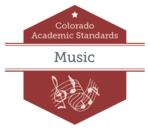You are here
Colorado Academic Standards: Music Introduction (adopted 2022)
![]()

On This Page
Purpose of Music
Prepared Graduates in Music
Standards in Music
Skill Aquisition Levels
Purpose of Music
"Music does a lot of things for people. It's transporting, for sure. It can take you right back, years back, to the very moment certain things happened in your life. It's uplifting, it's encouraging, it's strengthening." - Aretha Franklin
"Music expresses that which cannot be said and on which it is impossible to be silent." - Victor Hugo
"Music gives soul to the universe, wings to the mind, flight to the imagination, and life to everything." - Plato
"How great musicians create a mutual respect and trust on the bandstand can alter your outlook on the world and enrich every part of your life, understanding what it means to be a global citizen in the most modern sense." - Wynton Marsalis
By implementing a structured and standards-based music education, students continue the generational conversation and become fluent in the langauge of music as a manner of artisitc, intellectual, and cultural expression. The acts of performing, creating, and responding to music provide a means for development and growth in the ability to express the otherwise inexpressible and to facilitate growth in many areas of academic development.
Learning to read and notate music opens for students the limitless body of musical styles, forms, and repertiore, and allows them to see what they hear and hear what they see. The interconnections in music bring toether the understanding of contemporary and historcal cultures, as well as self-knowledge. Participation in music provides students with experiences and skills essential for success in the 21st-century workforce.
Music nurtures creativity, innovation, and cornerstone life skills that will be the key to opening doors for a more diverse and competitive workforce. In learning music, students use critical thinking, self-assessment, reasoning, problem solving, and collaboration, and make connections in new and imaginative ways as they progress through their musical education. All of these skills prepare our students for higher education and the 21st-century workforce. These standards outline the knowledge and skills needed by all Colorado citizens to participate productively in an increasingly creative economy and innovative society.
Prepared Graduates in Music
- Apply knowledge and skills through a variety of means to demonstrate musical concepts.
- Perform with appropriate technique and expressive elements to communicate ideas and emotions.
- Demonstrate practice and refinement processes to develop independent musicianship.
- Compose, improvise, and arrange sounds and musical ideas to communicate purposeful intent.
- Read, write, and analyze the elements of music through a variety of means to demonstrate musical literacy.
- Aurally identify and differentiate musical elements to interpret and respond to music.
- Evaluate and respond to music using criteria to make informed musical decisions.
- Connect musical ideas and works with societal, cultural and historical context to understand relationships and influences.
Standards in Music
The Colorado Academic Standards in music are the topical organization of the concepts and skills all Colorado students should know and be able to do throughout their preschool through twelfth-grade experience.
Expression of Music
The expression of music is the process of practice, refinement, and performance/demonstration of acquired musical knowledge and skills to communicate a range of thoughts and emotions.
Creation of Music
The creation of music is the demonstration of learned skills in the composition, improvisation, and arranging of music, using, but not limited to, written notation, iconic symbols, or graphic and electronic representations.
Theory of Music
The theory of music is the understanding of the distinctive language, conventions, mechanics, and structure of organized sound present in all cultural musics. Investigation of cultural music theory allows for a more complete understanding of all aspects of the musical process.
Response to Music
Respond to music focuses on the knowledge and perspectives needed to make informed evaluations and critiques of music. It also addresses the historical, cultural, and societal contexts which are often the beauty, heart, and soul of music.
Skill Acquisition Levels in Music
Novice is the entry point for a student new to self-selected music participation, or what might be expected of a student who has completed one full school year of participation, regardless of grade level
Intermediate is the level of approximately two full school years of music participation.
Proficient is the level of approximately three full school years of music participation.
Accomplished is the level for students who have achieved the standards in the previous three acquisition levels and choose to continue participating in music. Music teachers can work together with students in the accomplished level to meet the students’ needs in engaging with musical experiences and practices.
Supporting Diversity and Inclusion in Teaching Music
The 2022 Colorado Academic Standards Music Revision Committee supports including musical experiences that incorporate the social, cultural, and historical contexts included in the creation and performance of music. Professional music educators can facilitate musical experiences that promote recognition of, respect for, and responsiveness to diverse musics from around the world, including those musics that are traditionally underrepresented.


Connect With Us





